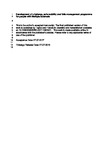Development of a balance, safe mobility and falls management programme for people with multiple sclerosis
| dc.contributor.author | Gunn, Hilary | |
| dc.contributor.author | Endacott, Ruth | |
| dc.contributor.author | Haas, Bernhard | |
| dc.contributor.author | Marsden, Jonathan | |
| dc.contributor.author | Freeman, Jennifer | |
| dc.date.accessioned | 2017-08-09T07:23:06Z | |
| dc.date.issued | 2017-08-07 | |
| dc.identifier.issn | 0963-8288 | |
| dc.identifier.issn | 1464-5165 | |
| dc.identifier.uri | http://hdl.handle.net/10026.1/9708 | |
| dc.description.abstract |
PURPOSE: To utilise stakeholder input to inform the structure, format and approach of a multiple sclerosis (MS) balance, safe mobility and falls management programme. MATERIALS AND METHODS: Using a three-round nominal group technique, participants individually rated their agreement with 20 trigger statements, followed by a facilitated group discussion and re-rating. Three mixed groups included service users (n = 15) and providers (n = 19). Quantitative analysis determined agreement, whilst qualitative responses were analysed thematically. RESULTS: Median scores for each of the 20 trigger statements did not change significantly over sequential rounds, however, deviations around the medians indicated more agreement amongst participants over time. Key recommendations were: Aims and approach: The programme should be tailored to the needs of people with MS. Falls and participation-based outcomes are equally important. Structure and format: The programme should balance expected burden and anticipated benefit, moving away from models requiring weekly attendance and promoting and supporting self-efficacy. Optimising engagement: Support to maintain engagement and intensity of practice over the long term is essential. Sustainability: Adequate funding is necessary. Staff should have MS specific knowledge and experience. CONCLUSIONS: Participants collaboratively identified critical components of a MS balance, safe mobility and falls management programme. They also highlighted the importance of a collaborative, user-centred, MS-specific approach. Implications for Rehabilitation People with multiple sclerosis need condition-specific interventions focussed on maximising balance and safe mobility and reducing falls. Programme design should support self-efficacy and flexible engagement. Adequate support and funding are seen as essential by both service users and providers. | |
| dc.format.extent | 2857-2866 | |
| dc.format.medium | Print-Electronic | |
| dc.language | en | |
| dc.language.iso | en | |
| dc.publisher | Informa UK Limited | |
| dc.subject | Self-management | |
| dc.subject | multiple sclerosis | |
| dc.subject | accidental falls | |
| dc.subject | balance | |
| dc.subject | rehabilitation | |
| dc.subject | nominal group technique | |
| dc.title | Development of a balance, safe mobility and falls management programme for people with multiple sclerosis | |
| dc.type | journal-article | |
| dc.type | Journal Article | |
| dc.type | Research Support, Non-U.S. Gov't | |
| plymouth.author-url | https://www.webofscience.com/api/gateway?GWVersion=2&SrcApp=PARTNER_APP&SrcAuth=LinksAMR&KeyUT=WOS:000450400300002&DestLinkType=FullRecord&DestApp=ALL_WOS&UsrCustomerID=11bb513d99f797142bcfeffcc58ea008 | |
| plymouth.issue | 24 | |
| plymouth.volume | 40 | |
| plymouth.publication-status | Published | |
| plymouth.journal | Disability and Rehabilitation | |
| dc.identifier.doi | 10.1080/09638288.2017.1362041 | |
| plymouth.organisational-group | /Plymouth | |
| plymouth.organisational-group | /Plymouth/Faculty of Health | |
| plymouth.organisational-group | /Plymouth/Faculty of Health/School of Health Professions | |
| plymouth.organisational-group | /Plymouth/REF 2021 Researchers by UoA | |
| plymouth.organisational-group | /Plymouth/REF 2021 Researchers by UoA/UoA03 Allied Health Professions, Dentistry, Nursing and Pharmacy | |
| plymouth.organisational-group | /Plymouth/Research Groups | |
| plymouth.organisational-group | /Plymouth/Research Groups/FoH - Applied Parkinson's Research | |
| plymouth.organisational-group | /Plymouth/Research Groups/Institute of Health and Community | |
| plymouth.organisational-group | /Plymouth/Research Groups/Plymouth Institute of Health and Care Research (PIHR) | |
| plymouth.organisational-group | /Plymouth/Users by role | |
| plymouth.organisational-group | /Plymouth/Users by role/Academics | |
| plymouth.organisational-group | /Plymouth/Users by role/Researchers in ResearchFish submission | |
| dc.publisher.place | England | |
| dcterms.dateAccepted | 2017-07-27 | |
| dc.rights.embargodate | 2018-8-7 | |
| dc.identifier.eissn | 1464-5165 | |
| dc.rights.embargoperiod | 12 months | |
| rioxxterms.versionofrecord | 10.1080/09638288.2017.1362041 | |
| rioxxterms.licenseref.uri | http://www.rioxx.net/licenses/under-embargo-all-rights-reserved | |
| rioxxterms.licenseref.startdate | 2017-08-07 | |
| rioxxterms.type | Journal Article/Review |


